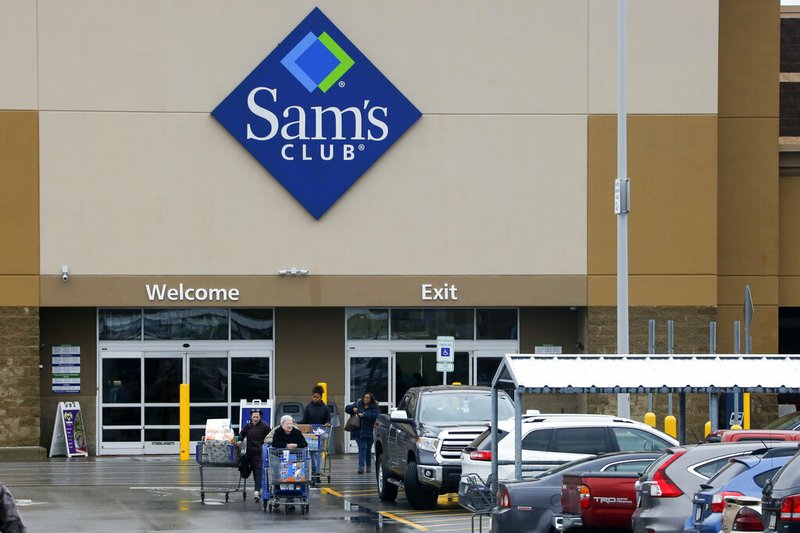Walmart Inc.'s Sam's Club is testing a plan to offer its members lower-cost options for some health care services, the company said Thursday.
The Bentonville-based retailer's members-only warehouse division is working with health insurance company Humana Inc. and telemedicine firm 98point6 Inc. on the program called the Sam's Club Care Accelerator Together with Humana.
The program aims to reduce out-of-pocket medical costs for members by selling discounted "bundles" of common services including primary care, dental, optical and alternative medicine.
Lori Flees, senior vice president for health and wellness at Sam's Club, said in a blog post that the pilot will start in early October in Michigan, Pennsylvania and North Carolina, with the potential to expand nationwide. She said the program is designed "especially for our members who shoulder a higher burden of health care costs, like small business owners or those with high-deductible plans."
Flees emphasized that the Care Accelerator is a discount health program and not a health insurance plan.
"Access to high-quality maintenance health care has been shown to improve overall, long-term health," Flees said. "We believe this program will help our members decrease out-of-pocket costs so they can better manage their budgets and their health." She said the company will use feedback from members to add new benefits and features to the Care Accelerator program.
Sam's Club members can choose from one of four bundles of services, ranging in price from $50 to $240 a year and potentially saving them between $400 and $1,100, Walmart said. All bundles include free prescriptions on certain generic medications and prepaid health debit cards worth $5 to $100 to be used in Humana's provider network.
The Starter A bundle also includes primary care visits via cellphone for $1, plus $60 eye exams and 20% off eyewear at Sam's Club. The Starter B product doesn't include the telemedicine option, but adds "savings on dental care." Both bundles cost $50 a year, and are said to offer savings of up to $400 per year.
At $100 a year, the Standard bundle offers all five features of the two starter bundles and touts savings of up to $600 annually. Finally, the Premium bundle, at $240 a year, adds free health screenings, up to 30% off alternative medicine and 10% off hearing aids purchased at Sam's Club. It purports to save members up to $1,100 a year.
Rising health insurance premiums and deductibles are straining the budgets of many individuals and families covered under an employer's plan. According to a Kaiser Family Foundation employer survey released Wednesday, workers pay an average of about $6,000 a year in health insurance premiums. More than 25% of all covered workers and nearly half of those employed by small businesses have an annual deductible of $2,000 or more.
People who work at companies where a large share of the employees are low-wage workers pay an average of $7,000 annually for a family plan, according to the survey. That's about $1,000 more than those at companies with large numbers of better-paid workers. Only a third of workers at the low-wage companies enroll in their employer's health plan -- about half the rate at better-paying companies, the survey of about 2,000 small and large businesses found.
Walmart's other recent forays into the health and wellness sector include a stand-alone health center it opened Sept. 13 in an Atlanta suburb. Walmart Health offers primary care; diagnostics; mental health counseling; and dental, optical and hearing services -- all with transparent, low pricing.
Sean Slovenski, president of health and wellness for Walmart's U.S. division, said the clinic is "just the beginning" of the retailer's plans to make health care more accessible for its U.S. customers. The clinic will serve as a pilot to test the model before expanding it to other communities, he said.
Then earlier this week, Walmart said it will expand its $1-a-day education benefit program to include seven college degrees and certifications in health care-related fields. The company hinted at plans to move further into the health industry, saying the new options will give employees a path to careers in health care as its own health and wellness strategy evolves.
Walmart and Sam's Club together operate more than 5,000 retail pharmacies, 3,000 vision centers and 400 hearing centers in the U.S. Walmart also has 19 in-store Care Clinics offering limited services in Georgia, South Carolina and Texas.
Dr. Joe Thompson, president and chief executive officer of the Arkansas Center for Health Improvement in Little Rock, said in a recent interview that with 18% of the U.S. gross domestic product going toward health care, it's not surprising that Walmart "is looking at what role it can play in that segment of our economy."
Neil Stern, a senior partner at retail consulting firm McMillan-Doolittle, agreed.
"From Walmart to Amazon to Best Buy (and obviously CVS, Walgreens), retailers are looking at health care as a significant opportunity for growth as the population ages and consumers look for more convenient and price-effective solutions," he said Thursday.
Carol Spieckerman, a retail consultant and president of Spieckerman Retail, said the Care Accelerator program "is yet another initiative that harnesses the synergy between Walmart's digital capabilities and its physical scale. Walmart has a real advantage here." The retailer "is attacking the health and wellness industry head-on," she said.
"It's a market that's ripe for reinvention on several fronts," Spieckerman said, citing cost savings, convenience and simplicity as important factors as the industry expands beyond traditional health care. She added that the company "has become quite adept at simplifying fragmented, complex businesses, and health care exemplifies this type of challenge."
Walmart's ties to Humana appear to go back to at least March 2018, when The Wall Street Journal reported the companies were discussing options for a partnership of some type. The report led to speculation that Walmart was considering acquiring Humana. However, no such deal ever materialized.
A Section on 09/27/2019
